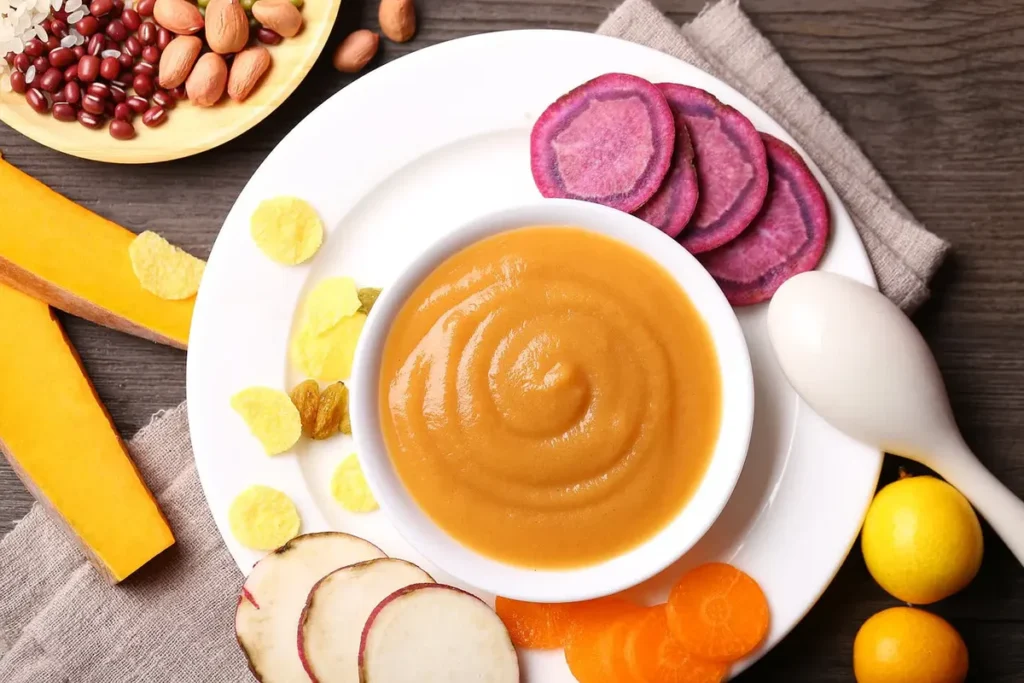Much of what adults eat may also be consumed by your baby, but the kind of food to be consumed depends on how old your child is. We actually feed our toddler Eleanora, 2 years old, everything we eat. As a general rule, you should apply the same guidelines you used for your own diet during pregnancy when feeding your baby the first foods.
Let’s have a look at the different foods you can feed your babies depending on the different stages:

Birth to 4 Month
Breastmilk or Formula, that’s what your baby needs!
For the first 4 months of age, your baby will get everything it needs from your breastmilk or special Formula. The World Health Organization ( WHO) strongly recommend breastfeeding babies until at least 6 month of age. Should you not be able to provide breast milk, choose an organic milk formula that is very close to breastmilk and contains all necessary minerals and nutrients for a healthy growth.
4 to 6 Months
Introduce the spoon!
Your baby should be at least 4 month old before you can introduce solid food. Your baby’s liver and digestive track will not be able to cope with solid foods before then as its organs are designed exclusively to digest milk. At 4 months, your baby will slowly lose its “repression reflex” , which causes your baby to automatically push out its tongue should when anything other than milk gets in his mouth. Once the “repression reflex” subsides you can slowly introduce semi solid foods with a spoon.
Great foods to start with are porridges of cereals and grains, and also banana, apples and mashed carrots, sweet potatoes and butter squash.
Don’t be discouraged if your baby refuses solid food, each baby has its own pace of development. Remember that your baby is now learning how to actually swallow food and this can take some time.
6 to 8 Months
Add those flavors!
Your baby most likely by now has its first teeth and wants to chew, time to add some new foods and texture to its diet. It is important to introduce your baby to as many flavors as possible to promote curiosity and to guarantee a balanced diet during this stage. Great foods for this stage are: Beans, Lentils and Oats. And also Nectarines, Plums, Squash, Peas, Green Beans, Yogurt and Chicken.
8 to 10 Months
Spice it up!
This stage is a very fun one because it is time to spice it up a little bit. You can start adding some cheese to the baby’s diet such as cottage cheese, Jack or Cheddar. Other great new foods to play with are Pasta, Buckwheat, Broccoli, Cauliflower, Onions, Eggplant, Kiwis, Beef, Eggs and Fish. Try different fish and meat dishes with a side of mashed vegetables, but as always try to keep it organic to avoid harmful substances.
10 to 12 Months
Make it Chunky!
By now your baby probably already has its favorite food! This stage is ideal to feed your baby a little “chunkier bits” and leave the thinner purees aside. Your baby is now ready to try Citrus Fruits (have your camera ready for funny faces), Corn, Spinach, Cucumber, Tomatoes, Soft Cheese ( Soft Cheese mixed with Avocado, one of our favorite!), Whole eggs and fully cooked meats.
We have gathered our favorite recipes by stages, check out our article How to make Homemade Baby Food!

